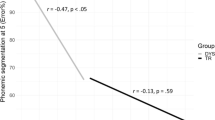Abstract
The present study retrospectively examined early difficulties with phonological coding and phonemic segmentation of German children who after four years in school were diagnosed as dyslexic. German, in comparison to English, exhibits rather simple and straight-forward grapheme-phoneme correspondences, and the initial teaching approach was phonics oriented. Despite these favorable circumstances for the acquisition of phonological coding, the majority of the later dyslexic children had particular difficulties with the accurate reading of nonwords and of unfamiliar words after about seven months of reading instruction. However, there were enormous differences between the dyslexic children. Two of them were completely unable to ‘blend’ phonemes into pronunciations, another seven were slow and error prone decoders, and three children had slow and laborious pronunciation assembly as the core problem. The majority of the later dyslexic children also exhibited phonemic segmentation deficits as tested with a nonword spelling task and a phoneme reversal task. In correspondence with findings from older German dyslexic children, the early difficulties with accurate phonological coding and phonemic segmentation were no longer found at the end of grade four. Children then suffered from very slow reading and poor spelling. In general, the difficulties of German dyslexic children emphasize the phonological impairment account of dyslexia. More specifically, these findings suggest that the assembly of letter sounds into pronunciations is particularly affected in the early phase of learning to read a consistent orthography.
Similar content being viewed by others
References
Bruck, M. (1990). Word recognition skills of adults with childhood diagnosis of dyslexia,Developmental Psychology 26: 439–454.
Cossu, G., Shankweiler, D., Liberman, I., Katz, L. & Tola, G. (1988). Awareness of phonological segments and reading ability in Italian children,Applied Psycholinguistics 2: 1–16.
Cossu, G., Shankweiler, D., Liberman, I. Y. & Gugliotta, M. (1995). Visual and phonological determinants of misreadings in a transparent orthography,Reading and Writing: An Interdisciplinary Journal 7: 237–256.
Frith, U. (1985). Beneath the surface of development dyslexia. In: K. E. Patterson, J. C. Marshall & M. Coltheart (eds.),Surface dyslexia (pp. 303–332). Hillsdale, NJ: Erlbaum.
Levelt, W. J. M. (1989).Speaking: From intention to articulation. Cambridge: The MIT Press.
Lovett, M. W. (1987). A developmental approach to reading disability: Accuracy and speed criteria of normal and deficient reading skill,Child Development 58: 234–260.
Mann, V. A. (1984). Longitudinal prediction and prevention of early reading difficulty,Annals of Dyslexia 34: 117–136.
Ognjenovic, V., Lukatela, G., Feldman, L. & Turvey, M. T. (1983). Misreading by beginning readers of Serbo-Croatian,Quarterly Journal of Experimental Psychology 35: 581–615.
Oney, B. & Goldman, S. R. (1984). Decoding and comprehension skills in Turkish and English: Effects of the regularity of grapheme-phoneme correspondences,Journal of Educational Psychology 76: 557–568.
Porpodas, C. D., Pantelis, S. N. & Hantziou, E. (1990). Phonological and lexical encoding processes in beginning readers: Effects of age and word characteristics,Reading and Writing: An Interdisciplinary Journal 2: 197–208.
Rack, J. P., Snowling, M. J. & Olson, R. (1992). The nonword reading deficit in developmental dyslexia: A review,Reading Research Quarterly 27: 29–53.
Sprenger-Charolles, L. & Casalis, S. (1995). Reading and spelling acquisition in French first graders: Longitudinal evidence,Reading and Writing: An Interdisciplinary Journal 7: 39–63.
Stanovich, K. E. (1994). Annotation: Does dyslexia exist?,Journal of Child Psychology and Psychiatry 35: 579–595.
Thorstad, G. (1991). The effect of orthography on the acquisition of literacy skills,British Journal of Psychology 82: 527–537.
Venetzky, R. L. (1970).The structure of English orthography. The Hague/Paris: Mouton.
Wimmer, H. (1995). The nonword reading deficit in developmental dyslexia: Evidence from German children,Journal of Experimental Child Psychology.
Wimmer, H. (1993). Characteristics of developmental dyslexia in a regular writing system,Applied Psycholinguistics 14: 1–33.
Wimmer, H. & Frith, U. (1993). Orthographies and learning to read: An English-German comparison. Unpublished manuscript. University of Salzburg, Austria.
Wimmer, H. & Goswami, U. (1994). The influence of orthographic consistency on reading development: Word recognition in English and German children,Cognition 51: 91–103.
Wimmer, H. & Hummer, P. (1990). How German speaking first graders read and spell: Doubts on the importance of the logographic stage,Applied Psycholinguistics 11: 349–368.
Wimmer, H., Landerl, K., Linortner, R. & Hummer, P. (1991). The relationship of phonemic awareness to reading acquisition: More consequence than precondition but still important,Cognition 40: 219–249.
Wolf, M. (1991). Naming and reading: The contribution of the cognitive neurosciences,Reading Research Quarterly 26: 123–140.
Author information
Authors and Affiliations
Corresponding author
Rights and permissions
About this article
Cite this article
Wimmer, H. The early manifestation of developmental dyslexia: Evidence from German children. Read Writ 8, 171–188 (1996). https://doi.org/10.1007/BF00555368
Issue Date:
DOI: https://doi.org/10.1007/BF00555368




